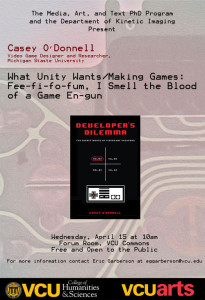I will be speaking at VCU’s interdisciplinary doctoral program in Media, Art, & Text is a joint endeavor of the Department of English, the School of the Arts and the Robertson School of Media and Culture. The program prepares students primarily to teach at the college or university level, although some pursue careers in related media fields. MATX emphasizes the historical and theoretical foundations essential to the scholarly study of media, both old and new, broadly defined.
I will be talking about Unity and my book.
Title: What Unity Wants: Fee-fi-fo-fum, I Smell the Blood of a Game En-gun
Abstract: Game engines, the software systems upon which games are developed, have significant design impacts on the games that they are used to create. Drawing on his extensive ethnographic work amongst AAA and “Indy” game developers, as well as his experiences as a juror for a variety of conferences, awards and festivals that feature games, Casey O’Donnell will explore the implications of the rise of the Unity game engine. Unity is currently one of the most popular game engines used by developers and educators.
Read through the lens of theoretical work in Science and Technology Studies and Architectural education, the role of “tools” in game design and development will be explored. In particular O’Donnell will discuss what he has begun to refer to as the “scent of Unity,” which he ascribes to a variety of the game design affordances of the game engine Unity. Drawing on the notion of the “Dance of Agency,” (Pickering, 1995) O’Donnell will explore the entanglement of designer, engine and computational platform as an important element for thinking about game design and the broader social/cultural implications of games.

